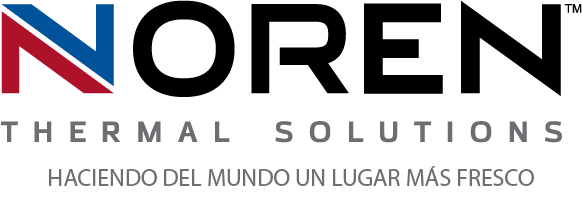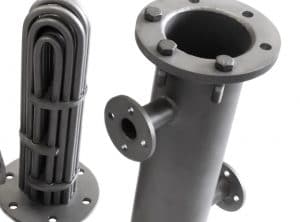 Today’s technology accomplishes more than some industries ever dreamed, and vital systems are constantly undergoing improvements and innovation. As companies take advantage of increasingly more sophisticated and more powerful technological solutions, the need for equally efficient and advanced thermal management solutions has also become more important. Over the last several decades, heat exchangers have helped fill that need with incredible results, helping companies save energy, boost efficiency, and streamline green business efforts. For many forms of technology, those benefits are even more profound when advanced thermal management is a key part of an application’s initial design. (more…)
Today’s technology accomplishes more than some industries ever dreamed, and vital systems are constantly undergoing improvements and innovation. As companies take advantage of increasingly more sophisticated and more powerful technological solutions, the need for equally efficient and advanced thermal management solutions has also become more important. Over the last several decades, heat exchangers have helped fill that need with incredible results, helping companies save energy, boost efficiency, and streamline green business efforts. For many forms of technology, those benefits are even more profound when advanced thermal management is a key part of an application’s initial design. (more…)
When Food & Beverage Companies Utilize Heat Exchangers
 Virtually every industry has benefited from the use of heat exchangers over the last several decades, and that includes food and beverage production. Like every other industry, food and beverage companies rely on technology for a wide range of processes. Thermal management is essential to keeping that technology running, and heat exchangers have long offered the most safest, most efficient, and most reliable electrical cooling solution. However, electrical thermal management isn’t the only process that heat exchangers have helped streamline for the food and beverage industry. Today, they’re also used for a wide range of applications, many of which are vital specifically to food and beverage production. (more…)
Virtually every industry has benefited from the use of heat exchangers over the last several decades, and that includes food and beverage production. Like every other industry, food and beverage companies rely on technology for a wide range of processes. Thermal management is essential to keeping that technology running, and heat exchangers have long offered the most safest, most efficient, and most reliable electrical cooling solution. However, electrical thermal management isn’t the only process that heat exchangers have helped streamline for the food and beverage industry. Today, they’re also used for a wide range of applications, many of which are vital specifically to food and beverage production. (more…)
Can Heat Exchangers Achieve Below-Ambient Cooling?
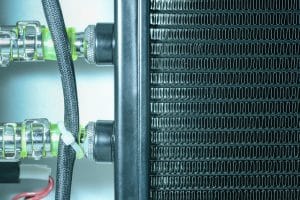 Heat exchangers can do a lot of things in the realm of electrical thermal management. For example, they can handle large amounts of electrical waste heat in a manner that’s just as effective and much more efficient than traditional cooling solutions. They can also help companies save significantly on the costs of thermal management, especially when it comes to energy and maintenance expenditures. However, some companies don’t realize one of the greatest accomplishments of modern heat exchangers – being able to provide below-ambient cooling without having to rely on HVAC or other methods of generating cold air. (more…)
Heat exchangers can do a lot of things in the realm of electrical thermal management. For example, they can handle large amounts of electrical waste heat in a manner that’s just as effective and much more efficient than traditional cooling solutions. They can also help companies save significantly on the costs of thermal management, especially when it comes to energy and maintenance expenditures. However, some companies don’t realize one of the greatest accomplishments of modern heat exchangers – being able to provide below-ambient cooling without having to rely on HVAC or other methods of generating cold air. (more…)
The Advancement of Electrical Enclosure Cooling
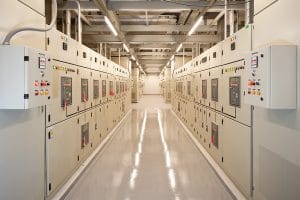 Properly cooling high-performance electrical enclosures (like control cabinets, and more) has long been the prominent goal of modern heat exchangers. For example, in industries where companies rely on technology of any size, the efficiency of their electrical cooling systems can play a significant role in the company’s overall success. Heat exchangers help ensure it’s a positive role by providing an efficient and easily manageable way to prevent electrical systems from overheating. Although heat exchangers have evolved far beyond just enclosure cooling, it still remains one of the most important and beneficial aspects of advanced heat exchanger technology. (more…)
Properly cooling high-performance electrical enclosures (like control cabinets, and more) has long been the prominent goal of modern heat exchangers. For example, in industries where companies rely on technology of any size, the efficiency of their electrical cooling systems can play a significant role in the company’s overall success. Heat exchangers help ensure it’s a positive role by providing an efficient and easily manageable way to prevent electrical systems from overheating. Although heat exchangers have evolved far beyond just enclosure cooling, it still remains one of the most important and beneficial aspects of advanced heat exchanger technology. (more…)
Heat Exchangers and the Rise of Automated Tech
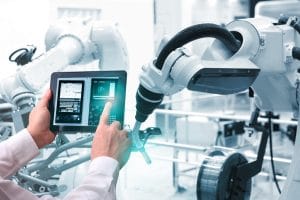 Heat exchangers first made an impact as a more affordable, efficient, and eco-friendly solution for cooling electrical enclosures (such as control cabinets). Before their introduction, companies relied mainly on thermal management solutions such as air conditioners and air compressors, which utilize cold air to prevent electrical waste heat from causing damage. Such solutions were effective when cooling large-scale equipment in the past, but they also came with high energy requirements and frequent, costly repairs and maintenance. For more advanced applications, like automated technology, such cooling solutions weren’t as viable. Yet, with heat exchangers, companies could enjoy faster and more powerful technologies without having to invest a fortune in thermal management for them. (more…)
Heat exchangers first made an impact as a more affordable, efficient, and eco-friendly solution for cooling electrical enclosures (such as control cabinets). Before their introduction, companies relied mainly on thermal management solutions such as air conditioners and air compressors, which utilize cold air to prevent electrical waste heat from causing damage. Such solutions were effective when cooling large-scale equipment in the past, but they also came with high energy requirements and frequent, costly repairs and maintenance. For more advanced applications, like automated technology, such cooling solutions weren’t as viable. Yet, with heat exchangers, companies could enjoy faster and more powerful technologies without having to invest a fortune in thermal management for them. (more…)
How Advanced Manufacturing Creates Innovative Heat Exchangers
 When it comes to meeting the more demanding thermal management needs of advancing technologies, heat exchangers can often offer several significant advantages. Their more streamlined designs allow them to fit more effectively into the smaller spaces provided by newer technology designs. Their continuous, looped transfer of electrical waste heat makes them more easily manageable in the long run. And, because they don’t rely on older cooling methods that utilized chilled air, heat exchangers can be designed for a wider variety of innovative applications. It all starts with the heat exchanger design process, which begins with a thorough design analysis and continues with advanced manufacturing processes that help ensure optimal results. (more…)
When it comes to meeting the more demanding thermal management needs of advancing technologies, heat exchangers can often offer several significant advantages. Their more streamlined designs allow them to fit more effectively into the smaller spaces provided by newer technology designs. Their continuous, looped transfer of electrical waste heat makes them more easily manageable in the long run. And, because they don’t rely on older cooling methods that utilized chilled air, heat exchangers can be designed for a wider variety of innovative applications. It all starts with the heat exchanger design process, which begins with a thorough design analysis and continues with advanced manufacturing processes that help ensure optimal results. (more…)
Are Heat Exchangers a Good Green Energy Investment?
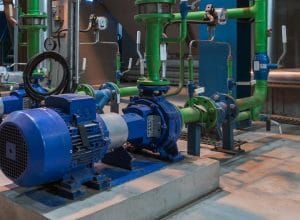 Despite the many different objectives and processes that differ between most industries, there are several things that companies in every industry share. For example, the need for effective technology and electrical cooling solutions is common, as most companies rely increasingly more heavily on technology to stay competitive. The need to implement greener operations and energy initiatives is also common, as consumers across every market demand companies take greater responsibility for their impact on the environment. In many cases, the use of modern heat exchangers has been an important benefit in several of those green energy initiatives. (more…)
Despite the many different objectives and processes that differ between most industries, there are several things that companies in every industry share. For example, the need for effective technology and electrical cooling solutions is common, as most companies rely increasingly more heavily on technology to stay competitive. The need to implement greener operations and energy initiatives is also common, as consumers across every market demand companies take greater responsibility for their impact on the environment. In many cases, the use of modern heat exchangers has been an important benefit in several of those green energy initiatives. (more…)
Why Companies Trade Air Conditioners for Heat Exchangers
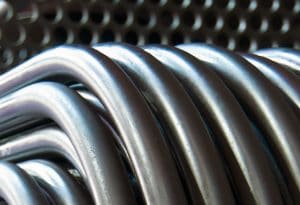 Just a few decades ago, the most common electrical thermal management solution (especially for large-scale operations) was air conditioning, or in some cases, air compressing units. At the time, they were the most efficient ways to overcome electrical waste heat and prevent overheating, making them essential for companies to take advantage of modern technologies. Since then, however, increasingly more companies in virtually all industries have traded their conventional electrical cooling systems with more advanced heat exchangers. Using more natural and streamlined methods of handling electrical waste heat, heat exchangers have helped companies eliminate many of the burdens that come with more traditional solutions. (more…)
Just a few decades ago, the most common electrical thermal management solution (especially for large-scale operations) was air conditioning, or in some cases, air compressing units. At the time, they were the most efficient ways to overcome electrical waste heat and prevent overheating, making them essential for companies to take advantage of modern technologies. Since then, however, increasingly more companies in virtually all industries have traded their conventional electrical cooling systems with more advanced heat exchangers. Using more natural and streamlined methods of handling electrical waste heat, heat exchangers have helped companies eliminate many of the burdens that come with more traditional solutions. (more…)
How Consumers Benefit when Companies Use Heat Exchangers
 The more companies implement heat exchangers for their various electrical and other thermal management needs, the more benefits those companies experience in terms of enhanced efficiency and productivity. Heat exchangers also lower overall operating costs for companies, particularly where it comes to energy used for thermal management processes. However, those benefits aren’t the only reason why companies should streamline their cooling technologies. For those that produce electronic and other types of consumer technologies, the use of heat exchangers has also helped boost the quality and efficiency of those products. (more…)
The more companies implement heat exchangers for their various electrical and other thermal management needs, the more benefits those companies experience in terms of enhanced efficiency and productivity. Heat exchangers also lower overall operating costs for companies, particularly where it comes to energy used for thermal management processes. However, those benefits aren’t the only reason why companies should streamline their cooling technologies. For those that produce electronic and other types of consumer technologies, the use of heat exchangers has also helped boost the quality and efficiency of those products. (more…)
Handling Waste Heat Better in the Food & Beverage Industry
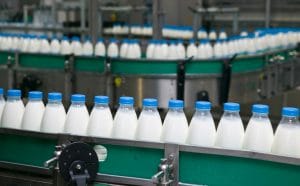 Like most industries, food and beverage production involve several unique processes that require the use of reliable thermal management systems. Many of the processes are now controlled or assisted by various forms of technology, each with its own electrical cooling needs. In many cases, those needs are most efficiently met with the help of modern heat exchangers. However, some of the pivotal processes involved with producing and packaging food & beverage products also rely on highly effective and reliable thermal management solutions. Depending on the specific applications, heat exchangers are also often used to supplement heat or remove it to keep temperatures low, all while helping companies optimize safety and minimize their overall operating costs. (more…)
Like most industries, food and beverage production involve several unique processes that require the use of reliable thermal management systems. Many of the processes are now controlled or assisted by various forms of technology, each with its own electrical cooling needs. In many cases, those needs are most efficiently met with the help of modern heat exchangers. However, some of the pivotal processes involved with producing and packaging food & beverage products also rely on highly effective and reliable thermal management solutions. Depending on the specific applications, heat exchangers are also often used to supplement heat or remove it to keep temperatures low, all while helping companies optimize safety and minimize their overall operating costs. (more…)

